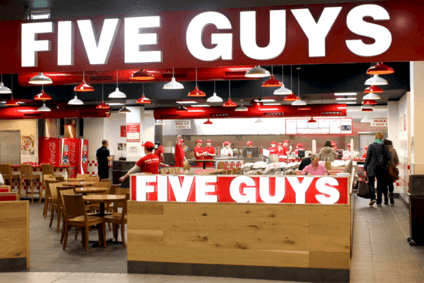As if hamburger-focused concepts in the UK did not already have enough competition, now the Americans are coming, bringing many of their better burger brands across the Atlantic in order to capitalise on one of Britain’s hottest restaurant segments.
In the past year, US chains BurgerFi, Smashburger and Fatburger have announced plans to open their first locations in the UK, joining peers like Shake Shack and Five Guys, which have two and about 30 units in the market, respectively.
The burger business is bound to only get better. According to Technomic’s 2015 Top 100 UK Chain Restaurant Report, burger concepts grew significantly in 2014, including a collective sales gain of 5.8% at fast-casual chains and 37.4% at full-service restaurants. What’s more, UK pub culture favours burger sales, even as competition intensifies from emerging casual-dining chains that put the burger front and centre or from the fast-casual segment, which is still in its infancy in the UK.
Five Guys, Fatburger and Smashburger are solidly fast casual. If anything, it seems Shake Shack pitches itself as something more premium than that, with BurgerFi perhaps aiming to try and play in the same tier as Shake Shack. So the newer entrants to the UK burger segment are all upmarket but you can probably stratify even a bit beyond that.
Burgers remain a fantastic vehicle for culinary innovation and experimentation with new flavours. Meanwhile, chains in the UK, as in the US, have found success in building burger sales by simply marketing their ingredient quality as better and fresher. To date, Gourmet Burger Kitchen has built the largest system of fast-casual burger restaurants, with 63 locations and nearly GBP50m in total sales at the end of 2014. But the rest of the field is wide open. There are already dozens of like-minded concepts in the United States that have been taking market share from quick-service brands like McDonald’s and Burger King. But those fast-food giants have held up better in the UK than they have in the United States, or even in rest of Europe for that matter, although, in McDonald's case, that may be more a reflection of its US operations setting a low bar to clear. McDonald’s UK system grew total sales 0.8%, compared to a 1.1% decline in the United States.
Chains need not position themselves in the 'better and fresher' segment to compete in the sector. Many of the emerging casual-dining brands and food-led pubs that Technomic tracks show great potential with innovative burgers promising over-the-top indulgence. This versatility opens up many avenues for sales growth not just for restaurant operators, but also for suppliers and ingredient manufacturers.

US Tariffs are shifting - will you react or anticipate?
Don’t let policy changes catch you off guard. Stay proactive with real-time data and expert analysis.
By GlobalDataMenu development pros can go the indulgent route and craft the next version of TGI Fridays' Bruce Lee Burger, which includes spicy Asian slaw, crispy noodles, sliced red chilli, jalapenos, toasted sesame seeds and chilli mayo. Or they can help a restaurant position themselves more like GBK, which appeals to consumers by touting its 100% prime beef, traditionally reared and grass fed on independent farms across the South West counties.
Meanwhile, many pubs smartly are embracing burgers to move away from a beverage-driven business – indeed, according to Technomic's 2015 UK Foodservice Industry Wallchart, food-led pubs are expected to increase sales about 4% this year and drinks-led pubs are projected to be slightly negative.
Pubs are clearly moving into "better burgers" – it seems everyone in the UK has a premium burger nowadays. I had one foodservice executive tell me a year ago he was tired of hearing about "better burgers". The eating occasion for a pub burger will be different than for the new entrants but, while the direct competition may not be as intense, it is still a battle for share of stomach.
As consumer expectations change as well, having better burgers is table stakes and is something that has come to be expected. Also, as food-led pubs increase, they do start to compete more directly for the lunch or dinner daypart and we will see a more competitive market. In any event, manufacturers ought to prepare themselves to help their key accounts bring in more customisation and more premium toppings. That’s probably an expectation a Smashburger could develop in British consumers when it comes to burgers.
However, despite the heightened competition, the market should still be hospitable to new chains. There ought to be room for everybody under the bun.





